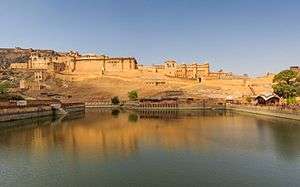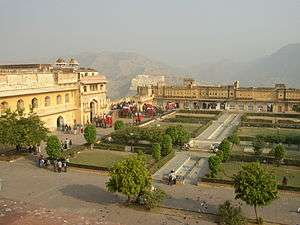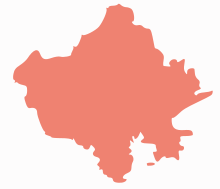Amer, India
| Amer, India | |
|---|---|
| Town | |
 Amer, India  Amer, India Location within Rajasthan | |
| Coordinates: 26°59′N 75°52′E / 26.983°N 75.867°ECoordinates: 26°59′N 75°52′E / 26.983°N 75.867°E | |
| Country | India |
| State | Rajasthan |
| District(s) | Jaipur |
| Time zone | IST (UTC+05:30) |
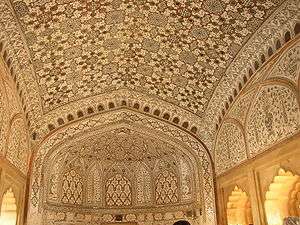
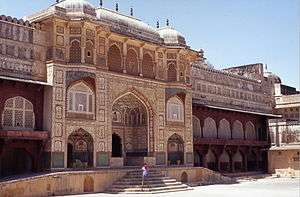
Amer (or Amber) (IPA: [ameɾ]; Hindi: आमेर, amer ?), now a part of the Jaipur Municipal Corporation, was a city of the Rajasthan state, India. Founded by Meena Raja Alan Singh (from Chanda clan of Meenas), Amer was a flourishing settlement dating as far back as 967 AD.
The picturesque situation of Amer at the mouth of a rocky mountain gorge, in which nestles a lovely lake, has attracted the admiration of travellers, including Victor Jacquemont and Reginald Heber. It is seen to be a remarkable example for its combined Rajput-Mughal architecture.The Amer Fort, a UNESCO World Heritage Site, is the top tourist attraction in the Jaipur area.
History
The first Rajput structure was started by Raja Kakil Dev when Amer became his capital in 1036, on the site of present-day Jaigarh Fort. Around 1037 AD, Amer was conquered by the Kachwaha clan of Rajputs.[1] Much of the present structure known as Amer Fort is actually the palace built by Raja Man Singh who ruled from 1590 to 1614 AD. The palace contains several spectacular buildings, such as the Diwan-i-Khas, and the elaborately painted Ganesh Pole built by the renowned warlord Mirza Raja Jai Singh I (Man Singh I's grandson). The old and original fort of Amer, dating from earlier Rajas or the Meena period, is what is known in the present day as Jaigarh Fort, which was actually the main defensive structure rather than the palace itself. The two structures are interconnected by a series of encompassing fortifications.
Amer was capital of the Kachwaha] until 1727 when the ruler of Amer, Sawai Jai Singh II founded a capital Jainagara (Jaipur), named after him, about nine kilometers south of Amer. After the founding of this new town, the royal palace and houses of prominent persons were shifted to Jaipur. The priests of Shila Devi temple, who were Bengali Brahmins, continued to live in the fort (to this date), while the Jaigarh fort above the palace also remained heavily garrisoned. The capital of Kachwaha was supplanted by the modern city of Jaipur, which is the capital of the Rajasthan state in India.
Controversy over renovation practices
Poor site management and development pressures have dramatically altered the historical integrity of Amer. The building that rings around the Jaleb Chwok courtyard "has been converted to a market place with shops selling showpieces and dresses. They have cafeterias, cyber cafés, etc," according to the Times of India.[2] In the summer of 2009, the Rajasthan High Court launched a three-member panel charged with investigating the controversial renovations and determining to what extent the cultural heritage of the site was compromised.[3]
List of villages
- Achrol
- Akhepura
- Bhavthari
- Beelpur
- Bhatto Ki Gali
- Bhoorthal
- Bichpadi
- Bilonchi
- Chandwali
- Chatarpura
- Chhaparadi
- Chittanu Kalan
- Chonp
- Dalpura
- Daulatapur
- Devgudha
- Dhand
- Durga Ka Bas
- Harduttapura
- Jahotawara
- Jairampura
- JaiSinghpura
- Jalsoo
- Kant
- Kanwarpura
- Khannipur
- Khora Beesal
- Khora Meena
- Khora Shyamdas
- Kishanpura
- Labana
- Lakher
- Maheshwaskalan
- Manpura Macheri
- Mundota
- Nangal Suwasatan
- Nangalpurohitan
- Nangalsiras
- Puhana
- Radhakrishnapura
- Raithal
- Rampura Dabri
- Roida
- Rundal
- Sewapura
- Shubhrampura
- Shyampura
- Sirohi
- Sirsali
- Shyam Nagar ( Lakher)
Visitor attractions
- Water Gateways
- Maota Lake
- Amber Fort
- Jaigarh Fort
- Jagat shiromani Temple
- Step well pool
See also
| Wikimedia Commons has media related to Amber, India. |
References
- ↑ "Rajputana(amer)".
- ↑ Times of India (21 February 2009). "Barbarians at Work in Amer?". Times of India.
- ↑ The Times of India (5 May 2009). "Three-member Panel to Probe Amer Fort Restoration". The Times of India.
Further reading
- Singh, Rachna (3 January 2009). "Amer Palace Renovation: Tampering with history?". Times of India.
- Times of India (21 February 2009). "How Marshall's Guidelines Were Violated". Times of India.
- Times of India (16 February 2009). "Film Crew Drilled Holes in Amer". Times of India.
- Times of India (14 February 2009). "HC Stays Shooting of Salman Film". Times of India.
